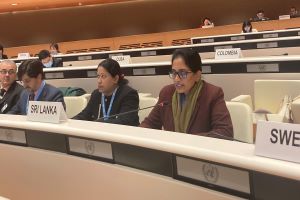
Madam President,
Distinguished delegates,
It is an honour to address this august assembly and to share my country’s perspectives on the work of the Conference on Disarmament, at a time the world is facing myriad of security threats which are at the core of issues discussed at the CD for decades, primarily the threat of nuclear escalation. Other current global security challenges such as transnational organized crime, terrorism, advanced weapon delivery systems add to the dangers associated with the existence of WMD. The situation has heightened the need for progress in global disarmament and the non-proliferation regime which remains the primary purpose of this Conference.
Madam President,
The times are difficult, and our responses require swift action with a sense of collective responsibility, conviction and firm determination. We are deeply concerned about our collective failure to reach a consensus outcome at the 10th Nuclear Non-Proliferation Treaty (NPT) Review Conference, a missed opportunity indeed given our increased vulnerabilities and growing nuclear threats. The implementation of disarmament commitments and obligations have stalled to a great extent, while the expansion and modernization of nuclear arsenals, and the introduction of advanced nuclear weapons continue to take place. We emphasize the equal importance of the three pillars of the NPT; nonproliferation, disarmament, and peaceful uses of nuclear energy and urge for meaningful dialogue to find possible convergence building on our work during the last review conference. Sri Lanka remains committed to the goal of a world free of nuclear weapons, the only guarantee against their proliferation.

Mr. President,
Let me thank you and your team for convening this meeting [thank the panelists] on this very important topic on negative security assurances.
Mr. President, let reiterate at the outset that total elimination of nuclear weapons is the only guarantee against the use or threat of use of nuclear weapons. As stated in our previous statement to this Conference in January this year, we attach utmost priority to the goal of complete and verifiable elimination of nuclear weapons. Negative Security Assurances (NSAs), while it is commonly agreed as an essential legitimate interest of non-nuclear weapon states, is only an interim measure pending the achievement of a world free of nuclear weapons.
Final document of the 1978 First Special Session on Disarmament obliges nuclear-weapon states to “pursue efforts to conclude, as appropriate, effective arrangements to assure non-nuclear-weapon States against the use or threat of use of nuclear weapons”. The topic of NSAs has been in the agenda of the CD since its inception of 1979. We also note the UN Security Council resolution 984 adopted unanimously in 1995 providing pledges on NSAs to nonnuclear-weapon States parties of the NPT in the context of obtaining an indefinite extension of the NPT. Furthermore, the consensus Action Plan of the 2010 NPT Review Conference refers to action points 8 and 9 on NSAs. However, despite discussions that have been continuing in the CD in various forms over the years, we have not been able to conclude a legally binding instrument to effectively assure non-nuclear-weapon States (NNWS) against the use or threat of use of nuclear weapons.
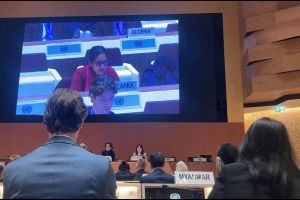
Mr President,
[I thank you Mr. President, for your kind words of welcome.]
Sri Lanka congratulates Egypt and you, Ambassador Ahmed Gamaleldin, on assuming the first Presidency of the 2023 session of the Conference on Disarmament. My delegation assures you and other P6 Presidencies of our full support and cooperation to find common ground for fulfilling CD’s obligations towards strengthening international peace and security. We also thank the Secretary General and the CD Secretariat for their continuous support.
I have the honour to make a statement at the plenary of this august Conference following my assumption of duties as the Permanent Representative of Sri Lanka to the UN in Geneva earlier this month. It is a pleasure to be back in the Conference on Disarmament after 20 years; however it is sad to see that the CD is still going through excessive institutional pain year after year with no real progress on fulfilling its negotiating mandate. I look forward to working with all delegations in a spirit of cooperation and wish to reiterate our position that only through confidence building and equal respect for the security of all Member States that we will be able to achieve the much-needed consensus towards adopting a programme of work.
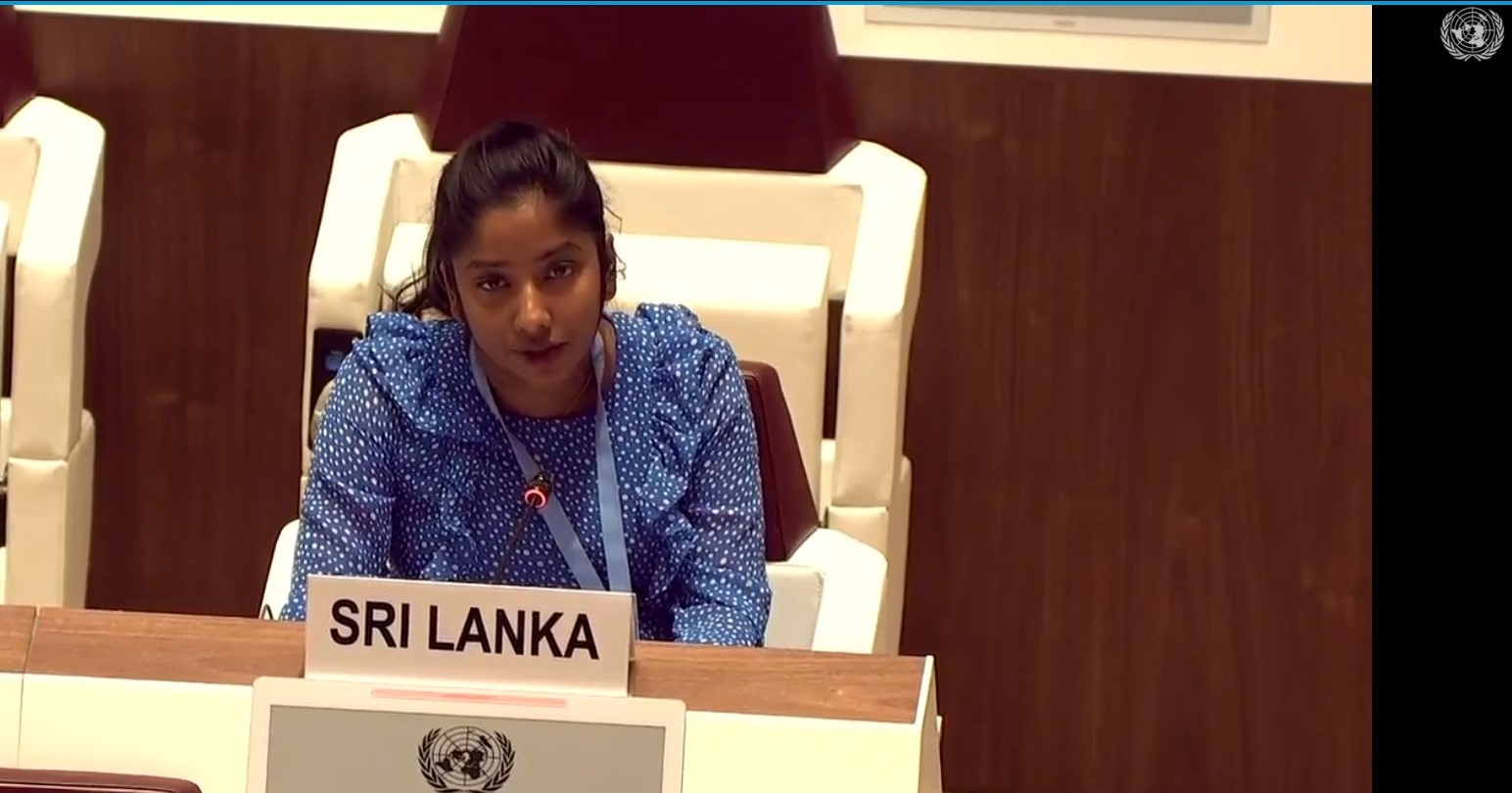
Agenda Item 8: General Exchange of Views
Mr. President,
We join with other delegations in congratulating Ambassador Aidan Liddle of the United Kingdom on your assumption as President of the Tenth Meeting of States Parties to the Convention on Cluster Munitions. Please be assured of our delegation’s full support in ensuring a successful conclusion to our deliberations. We also wish to thank the CCM ISU for their work to implement the Convention.
Mr. President,
At the outset allow me to reiterate Sri Lanka’s strong commitment to realize the humanitarian objectives and principles of the Convention on Cluster Munitions, to put an end to inhumane injury and suffering caused by cluster munitions during and after conflicts. Sri Lanka had the honour to preside over the 9th Meeting of State Parties to the Convention in 2019, one year after its accession to the Convention.
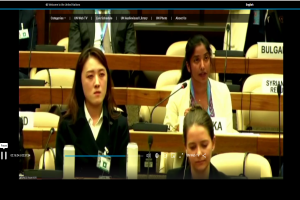
Statement by Sri Lanka on General Exchange of Views
Mr. Chair,
Sri Lanka would like to congratulate you on your assumption of the Chair of the first session of the 2022 of the OEWG on reducing space threats and for the opportunity to share our views on this subject. You have our full support in moving this process forward towards a substantive outcome. We would also like to appreciate the thought-provoking presentations made by today’s panelists.
Sri Lanka’s active engagement on the issue of Prevention of Arms Race in Outer Space (PAROS) has been well known and dates back to the early 80’s when with likeminded developing states, we called for the preservation of outer space as the common heritage of all mankind, to be used in cooperation and solely for peaceful purposes. It is in as far back as 1985 that Sri Lanka proposed a moratorium on the testing and development of space weapons preceding multilateral negotiations on a treaty to prohibit all weapons in space. As you are aware Sri Lanka continues to present the First Committee Resolution on the Prevention of an Arms Race in Outer Space (PAROS) alternatively with Egypt each year for over four decades and remains true to its principled position that outer space is the common heritage of all humanity and should be kept free of weaponization.
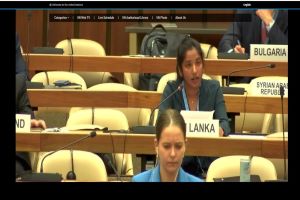
Statement by Sri Lanka
9 May 2022
Mr. Chair,
Since the first launching of a satellite in 1957, space exploration, interest and use of space have developed rapidly. Conflict in space could affect not only space faring nations but also those who do not have space power in view of the interconnectedness and the reliability of space based services. The Outer Space Treaty, the legal cornerstone of international law on space activities, recognizes in its preamble “the common interest of all mankind in the progress of the exploration and use of outer space for peaceful purposes” and establishes in its Article 3 the basic principle that, “activities in the exploration and use of outer space, including the moon and other celestial bodies, shall be in accordance with international law, including the Charter of the United Nations.” In addition, the Rescue Agreement of 1968, the Liability Convention of 1972, Registration Convention of 1974, the Moon Treaty of 1984 as well as UN declarations and principles which are non binding in nature provide important references to existing legal regime and principles on space behaviour.
- Address by the Hon. Foreign Minister of Sri Lanka at the High Level Session of the Conference on Disarmament, 28 February 2022
- Sixth Review Conference of the Convention on Prohibitions or Restrictions on the Use of Certain Conventional Weapons Which May be Deemed to Be Excessively Injurious or to Have Indiscriminate Effects (CCW) - Intervention during the adoption of the Report o
- Convention on Prohibitions or Restrictions on the Use of Certain Conventional Weapons Which May be Deemed to Be Excessively Injurious or to Have Indiscriminate Effects CCW Sixth Review Conference General Exchange of Views Statement-Sri Lanka 13.12.2021
